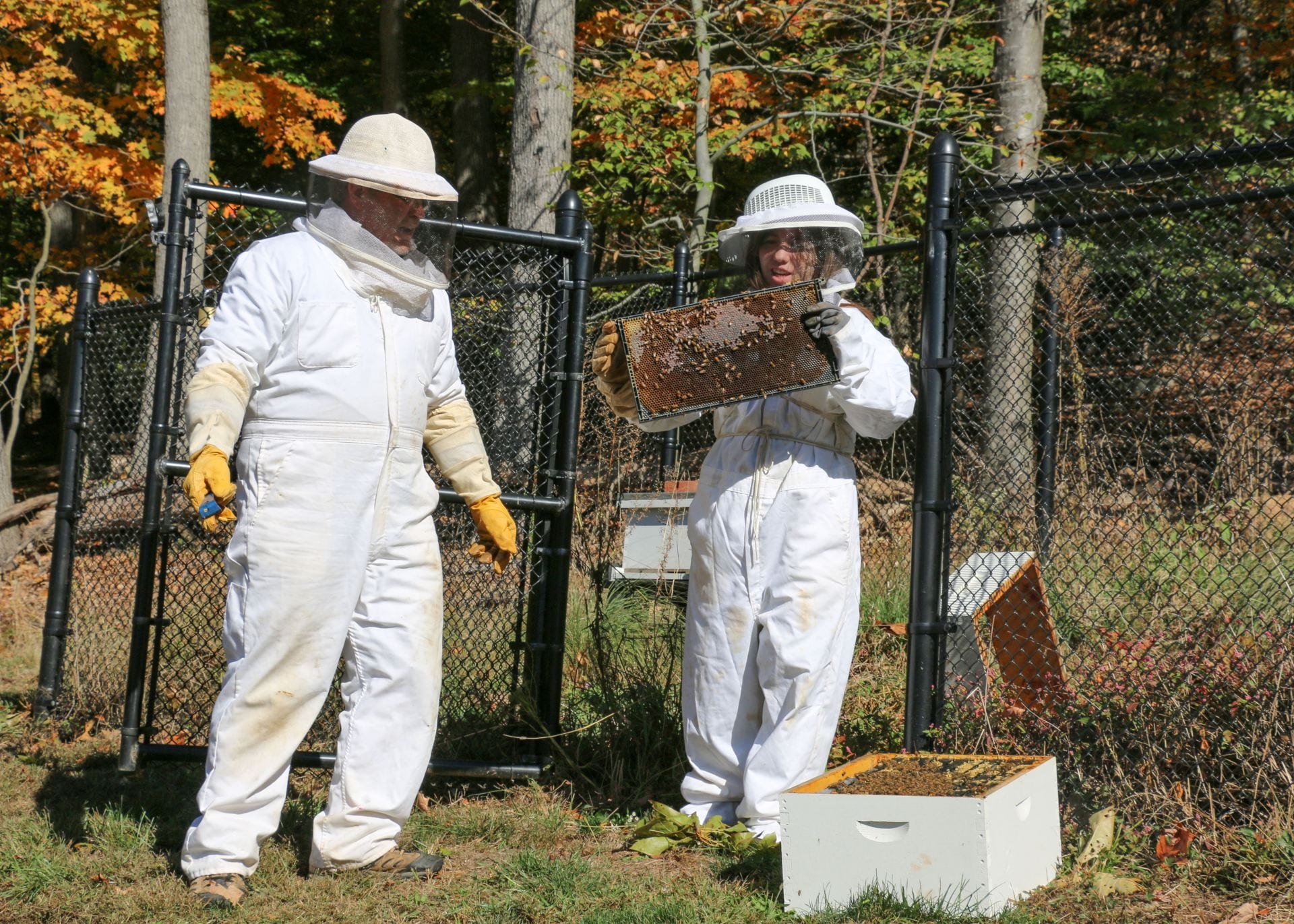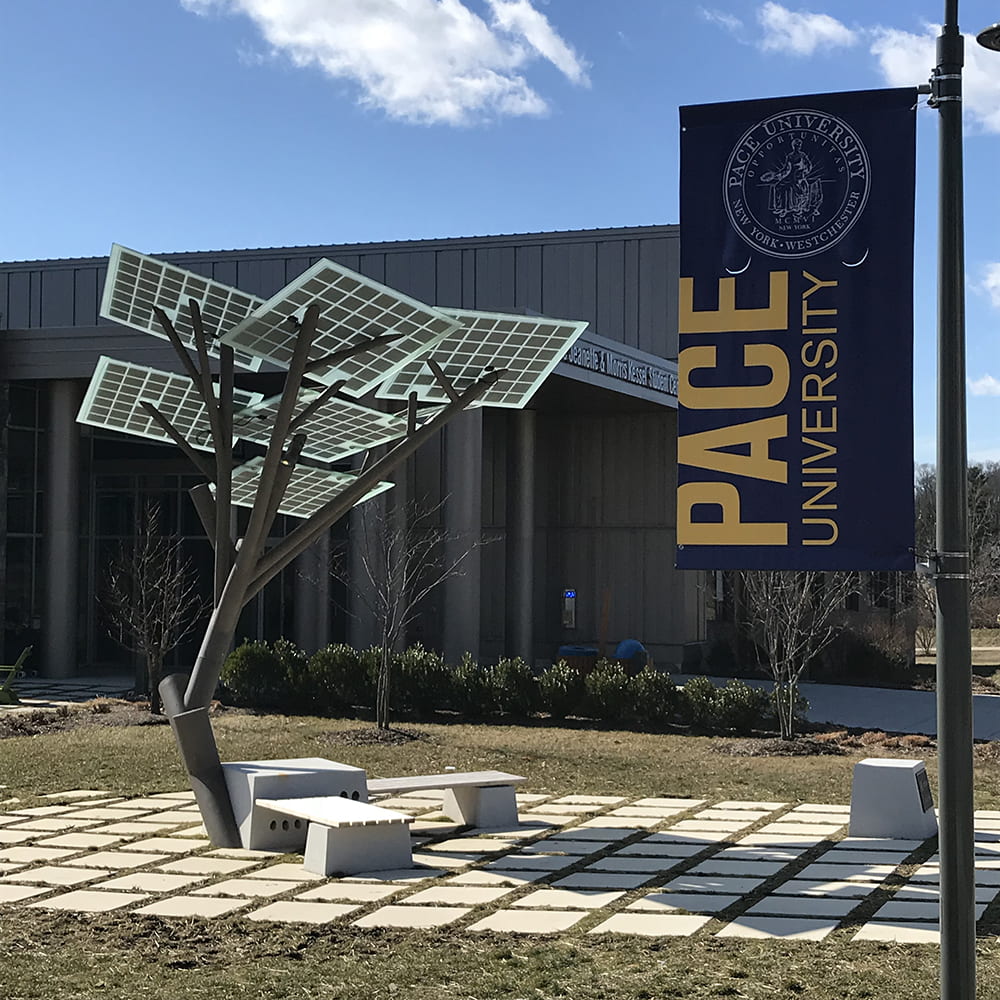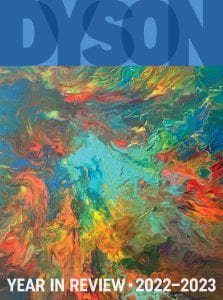
Pace Pleasantville Designated as a Bee Campus
In recognition of its commitment to creating a sustainable habitat for pollinators, the Pace Pleasantville campus is now an officially certified Bee Campus USA affiliate. The University received the designation from Bee City USA (an initiative of the Xerces Society) in March, through the efforts of students, administrators, and faculty including Michael Rubbo, PhD, a clinical associate professor in the environmental studies and science department. The initiative was also supported by the Dyson College Institute for Sustainability and the Environment. “[The designation] shows our commitment to creating a sustainable campus that will function both as a healthy ecosystem for native plants and animals and as a living laboratory for students,” Rubbo said. Currently, the Nature Center houses beehives for demonstration and education. Future plans include hosting pollinator-focused events and creating additional pollinator gardens to enable more students to study the bees and develop conservation solutions.
Dyson College Institute for Sustainability and the Environment Debuts New Programs
Committed to bringing together University faculty, students, and offerings that address environmental and sustainability issues, DCISE debuted two new programs during the 2019–20 academic year.
The “Science Training for Environmental Professionals” workshop series was created as a free opportunity for local environmental stakeholders to gain new knowledge to advance their initiatives. Associate Professor of Biology Erika Crispo, PhD, served as the inaugural guest speaker.
“Wildlife in Focus: Curing the Crisis Through Education and Action” included conversations with wildlife veterinarian and founder of Veterinary Initiative for Endangered Wildlife Deborah McCauley, PhD, and wildlife rehabilitator Patrick Moore, as well as a screening of The Last Animals, an award-winning documentary about the fight to protect rhinoceroses and elephants from poachers.
According to DCISE Director of Programming Michelle Land, a clinical associate professor in the environmental studies and science department, the year-long program “was designed to educate our community about the drivers of species decline, while empowering them to take actions that will forestall further losses.”

Combining imagination, technology and sustainability, Pace University unveiled a “solar tree” providing clean energy on the Pleasantville campus in November 2019. The project was initiated by Dyson College students and supported by Consolidated Edison Company of New York.
Photo courtesy of Stephanie Roman, New Roman Creative.
In Brief: Center for Community Action and Research
For more than a decade, the Center for Community Action and Research (CCAR) has built beneficial partnerships with community organizations and national civic engagement initiatives, and empowered students to get involved. Highlights from the 2019–20 academic year include:
- In recognition of their service and dedication to improving the quality of life in their communities, six members of the Dyson College community received Jefferson Awards for Public Service Bronze Medals: political science student Laurianne Gutierrez ’20; Natalie Hernandez ’20, majoring in digital journalism; Kaitlyn Houlihan ’19, BA Political Science; Anne Toomey, PhD, an assistant professor in the Department of Environmental Studies and Science; Denise Santiago, director of Pace’s Office of Multicultural Affairs and an adjunct professor in the Department of Sociology and Anthropology; and Laurie Brown Kindred, Pace School of Performing Arts production manager.
- On February 28, CCAR hosted “Debating for Democracy on the Road: An Activism Training with Beautiful Trouble,” an all-day conference exploring the strategy of successful grassroots campaigns. The event drew more than 40 participants from both campuses as well as from Wagner College.
- Melanie LaRosa, an assistant professor in the media, communications, and visual arts department, was selected for the first cohort of the Mellon Periclean Faculty Leadership Program in the Humanities. This Project Pericles consortium program is supported by the Andrew W. Mellon Foundation and was established to foster civic engagement in teaching and learning. LaRosa has received an award of $4,000 toward a multimedia storytelling course.

